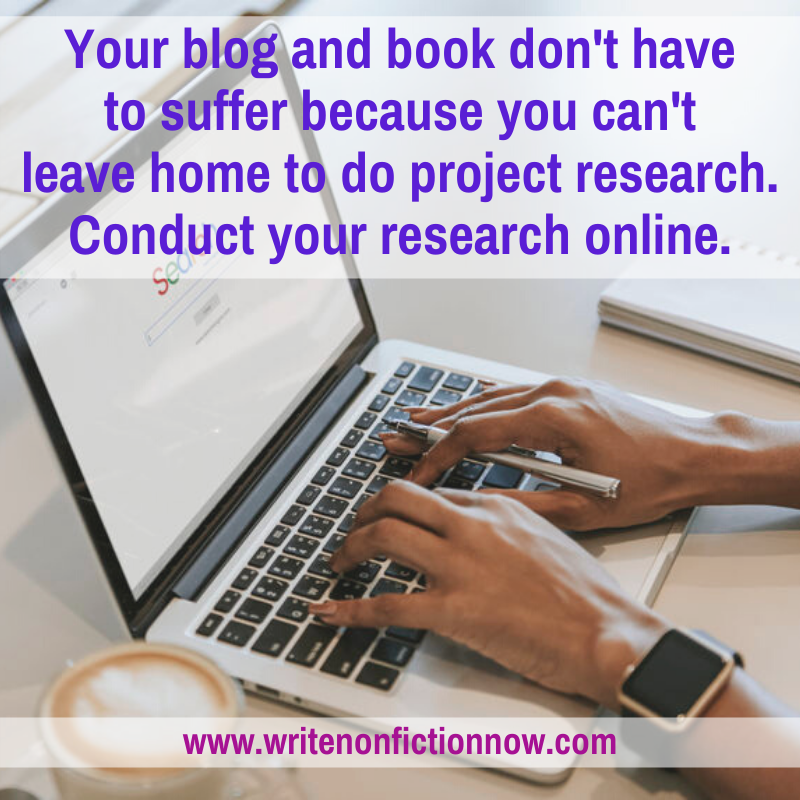It’s easy to get overwhelmed by the research needed for a blog post, blogged book, or book. That’s when you might put the project on the back burner, especially if you prefer or are forced to stay home. If, however, the project is important to you, you need to find a way to get the research done now…not later. In today’s post, Rodney Laws, an e-commerce expert (@EcomPlatforms.io), offers several tips on how to do effective research online—without leaving the comfort of your home.
As a blogger and writer, you often get ideas, but sometimes, to carry out those ideas in the form of a blog post or book, you have to do research. That need for research may cause you to file away your ideas to work on “at some point” in the future.
Yet, writing-related research is an excellent example of something that doesn’t have to be put off to some random time in the future. Perhaps you’ve thought that you’ll start your blog, write that book, or create that in-depth guide at some point. But you haven’t considered why you are postponing these projects indefinitely.
The truth is that most of us look for excuses to delay difficult tasks. Why? We’re intimidated by them and afraid of failing.
And sometimes, research feels a bit overwhelming, time-consuming, and challenging. And the need for research may bring up your feelings of imposter syndrome or not being good enough. After all, if you were the expert, you wouldn’t need to do research, right?
Wrong. Even experts conduct research for their writing projects. They know there is always something more to learn.
You Can Research from Home
As I write this, the world is still gripped by the COVID-19 pandemic, which leaves most people waiting in their homes for better things. Some dwell on the negatives, but those who look for the positives learn how often their attitudes hold them back.
Maybe you think that COVID-19 is a reason to not research your blogged book because you can’t get to the library right now to do your research or meet with an expert in person for an interview. If so, it’s time to rethink how you conduct research.
Consider that writers have worked in seclusion since time immemorial. They emerged from their isolation only to acquire supplies or carry out research. But, in this day and age, you can order supplies and complete research expeditions from home via the internet—even during a pandemic.
To help you research effectively, here are some tips for conducting your book or blog research online.
Find and Join Relevant Online Communities
The internet is the biggest congregation of enthusiasts that has ever existed. Everyone uses the internet, but the near-endless stream of content that floods it is produced by interesting and passionate people, many of whom are experts in their fields. If there’s a question you need answered or a concept you’d like explained in more detail, someone out there can help.
The best way to find the right people is to investigate online communities that cover the area (or areas) you’re researching. Search for “[your topic] forum” and see what comes up. Let’s say you wanted to write a book about mental health, a concern that’s steadily being taken more seriously. Search Google for “mental health forum,” and you’ll find your search yields numerous places where people discuss that topic.
You can also look to Reddit, one of the best destinations for those seeking community support. Look up “mental health reddit” in your favorite search engine, and you’ll find several subreddits covering it. Select a handful of communities (whether subreddits or forums), and create accounts, and start participating. Learn more about the people who frequent them and begin to ask questions.
As a useful bonus, joining those communities will be a huge help down the line when you’ve completed your project and want to promote it. Modern retailers commonly use established communities to expand their audiences. You can do something similar to get your project a lot of attention without spending heavily on marketing.
Keep Up with Relevant Blogs and Digital Publications
Writers of all stripes need to read voraciously (as Stephen King notably said, “Read, read, read”). Those creating fictional worlds must absorb creative writing to inspire them, while those writing about real-life events must hone their understanding of how best to frame them by reading historical accounts. Reading relevant books is something you should be doing in your spare time, but you also need to include reading in your research time.
Think about all the bloggers out there that address the same subjects you intend to address. It’s important to know what they’re doing, so you can better understand what can make your project unique. You also need to stay apprised of events in your field, because they will heavily influence the direction of your work and the viability of your approach.
It’s also a good idea to flesh out your reading rotation with blogs that add additional information to your research efforts. Find those that offer sound advice about the topic you plan to write or blog about. The more you read, the better off you’ll be.
Lean on Friends, Family Members, and Colleagues
Imagine how little you’d be able to achieve through your research if you only used the information you uncovered through your efforts. However, you could reach out to others for research help.
You could interview someone. You could draw from community knowledge, or you could read existing literature from other authors and experts. You could even split elements of the work with people you know who are willing to help.
The bigger the project, the more research is required, and you don’t need to do it all alone. The end product will still be yours to shape. It’s a simple matter of accepting that trawling through online journals takes time, and many people currently have a lot of time. Wouldn’t you help a friend if they asked you to support them with some project research?
If you know people who share your interests (or your profession), that will be particularly useful when seeking support. However, even those who are totally unfamiliar with your project can help out in various smaller ways. It’s about working smarter instead of harder, and working together on a project makes research fun.
The sooner you get your research done, the sooner you can get back to the part you really care about: writing your blog or book.
The internet makes it entirely possible to conduct wide-ranging project research from home. Just be sure to take full advantage of all the resources available to you.
Do you have a tip for doing effective research from home? Tell me in a comment—and please share this post with another blogger.
About the Author
 Rodney Laws is an e-commerce expert with over a decade of experience in building online businesses. Check out his reviews on EcommercePlatforms.io and you’ll find practical tips that you can use to build the best online store for your business. Connect with him on Twitter @EcomPlatforms.io.
Rodney Laws is an e-commerce expert with over a decade of experience in building online businesses. Check out his reviews on EcommercePlatforms.io and you’ll find practical tips that you can use to build the best online store for your business. Connect with him on Twitter @EcomPlatforms.io.
Photo courtesy of rawpixel


Rodney,
Thank you for these thoughtful and useful ideas for researching from home. I loved the one on leaning on friends and colleagues. I had a research need last week and used that one to find what I needed. I asked several online groups a simple question, then got several people who gave similar answers and I was able to move forward with my project.
Terry
author of 10 Publishing Myths, Insights Every Author Needs to Succeed